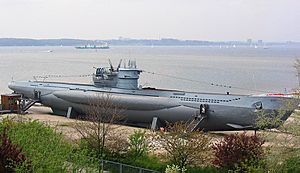German submarine U-1104 facts for kids
The German submarine U-1104 was a special kind of submarine called a Type VIIC/41 U-boat. It was used by Germany's navy during World War II.
U-1104 was ordered on 14 October 1941. Its construction began on 29 June 1943, at a shipyard called Nordseewerke in Emden, Germany. The submarine was launched into the water on 7 December 1943. It officially joined the navy on 15 March 1944, under the command of a captain named Rüdiger Perleberg.

U-995 Type VIIC/41 at the Laboe Naval Memorial. This U-boat is almost identical to U-1104.
|
|
Quick facts for kids History |
|
|---|---|
| Name | U-1104 |
| Ordered | 14 October 1941 |
| Builder | Nordseewerke, Emden |
| Yard number | 226 |
| Laid down | 29 June 1943 |
| Launched | 7 December 1943 |
| Commissioned | 15 March 1944 |
| Fate |
|
| General characteristics | |
| Type | Type VIIC/41 submarine |
| Displacement |
|
| Length |
|
| Beam |
|
| Height | 9.60 m (31 ft 6 in) |
| Draught | 4.74 m (15 ft 7 in) |
| Installed power |
|
| Propulsion |
|
| Speed |
|
| Range | |
| Test depth |
|
| Complement | 44-52 officers & ratings |
| Armament |
|
| Service record | |
| Part of: |
|
| Commanders: |
|
| Operations: |
|
| Victories: | None |
Contents
Submarine Design and Features
U-1104 was a Type VIIC/41 submarine. These submarines were an improved version of earlier Type VIIC models.
Size and Weight
When U-1104 was on the surface, it weighed about 769 tonnes (which is 757 long tons). When it was underwater, it weighed more, about 871 tonnes (857 long tons). The submarine was about 67.10 meters (220 feet 2 inches) long in total. Its main body, called the pressure hull, was 50.50 meters (165 feet 8 inches) long. The submarine was 6.20 meters (20 feet 4 inches) wide and 9.60 meters (31 feet 6 inches) tall. It sat 4.74 meters (15 feet 7 inches) deep in the water.
Engines and Speed
The submarine had two powerful diesel engines for moving on the surface. These engines could produce between 2,800 and 3,200 horsepower. When underwater, it used two electric motors, which produced 750 horsepower. These motors turned two propellers, each about 1.23 meters (4 feet) wide.
U-1104 could travel at a top speed of 17.7 knots (about 32.8 kilometers per hour) on the surface. Underwater, its top speed was 7.6 knots (about 14.1 kilometers per hour). It could travel about 8,500 nautical miles (15,700 kilometers) on the surface at a slower speed of 10 knots. Underwater, it could go about 80 nautical miles (150 kilometers) at 4 knots. The submarine could dive to depths of up to 230 meters (750 feet).
Weapons and Crew
U-1104 was equipped with five torpedo tubes, which are special tubes for launching torpedoes. Four of these were at the front (bow) of the submarine, and one was at the back (stern). It could carry 14 torpedoes or 26 naval mines.
For defense, it had several guns:
- One 8.8 cm (3.5 inch) naval gun, with 220 rounds of ammunition.
- One 3.7 cm (1.5 inch) anti-aircraft gun.
- Two 2 cm (0.79 inch) anti-aircraft guns.
The submarine usually had a crew of 44 to 52 sailors and officers.
Service During World War II
U-1104 was part of two different U-boat groups, called flotillas. From March 1944 to January 1945, it was with the 8th U-boat Flotilla. Then, from February to May 1945, it joined the 11th U-boat Flotilla. The submarine went on one patrol mission between February and March 1945. It did not sink any enemy ships during its service.
End of Service
On 9 May 1945, U-1104 surrendered to the Allied forces in Bergen, Norway, as World War II was ending. It was then moved to Loch Ryan, Scotland, on 30 May 1945.
U-1104 was one of 116 U-boats chosen to be sunk as part of "Operation Deadlight." This operation was designed to prevent Germany from using its submarines again. On 1 December 1945, U-1104 was towed out to sea and sunk by naval gunfire. Its wreck now rests in the Atlantic Ocean at coordinates 56°10′N 10°05′W.
See also
 | William Lucy |
 | Charles Hayes |
 | Cleveland Robinson |

